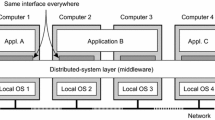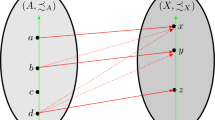Abstract
An optimal distributed solution to the dining philosophers problem is presented. The solution is optimal in the sense that it incurs the least communication and computational overhead, and allows the maximum achievable concurrency. The worst case upper bound for concurrency is shown to ben div 3,n being the number of philosophers. There is no previous algorithm known to achieve this bound.
Similar content being viewed by others
References
E. W. Dijkstra, Hierarchical ordering of Sequential Processes,Acta Informatica 1(2):115–138 (1971).
T. A. Cargill, A Robust Distributed Solution to the Dining Philosophers Problem,Software Practice and Experience,12(10):965–969 (1982).
E. Chang,n-Philosophers: An Exercise in Distributed Control,Computer Networks 4:71–76 (1980).
H. Wedde, A Starvation-Free Solution for the Dining Philosophers Problem by use of Interaction Systems,Proc. MECS'81 Symposium, Lecture Notes in Computer Science 118, Springer, Berlin, pp. 534–543 (1981).
Author information
Authors and Affiliations
Rights and permissions
About this article
Cite this article
Rana, S.P., Banerji, D.K. An optimal distributed solution to the dining philosophers problem. Int J Parallel Prog 15, 327–335 (1986). https://doi.org/10.1007/BF01407879
Received:
Accepted:
Issue Date:
DOI: https://doi.org/10.1007/BF01407879




